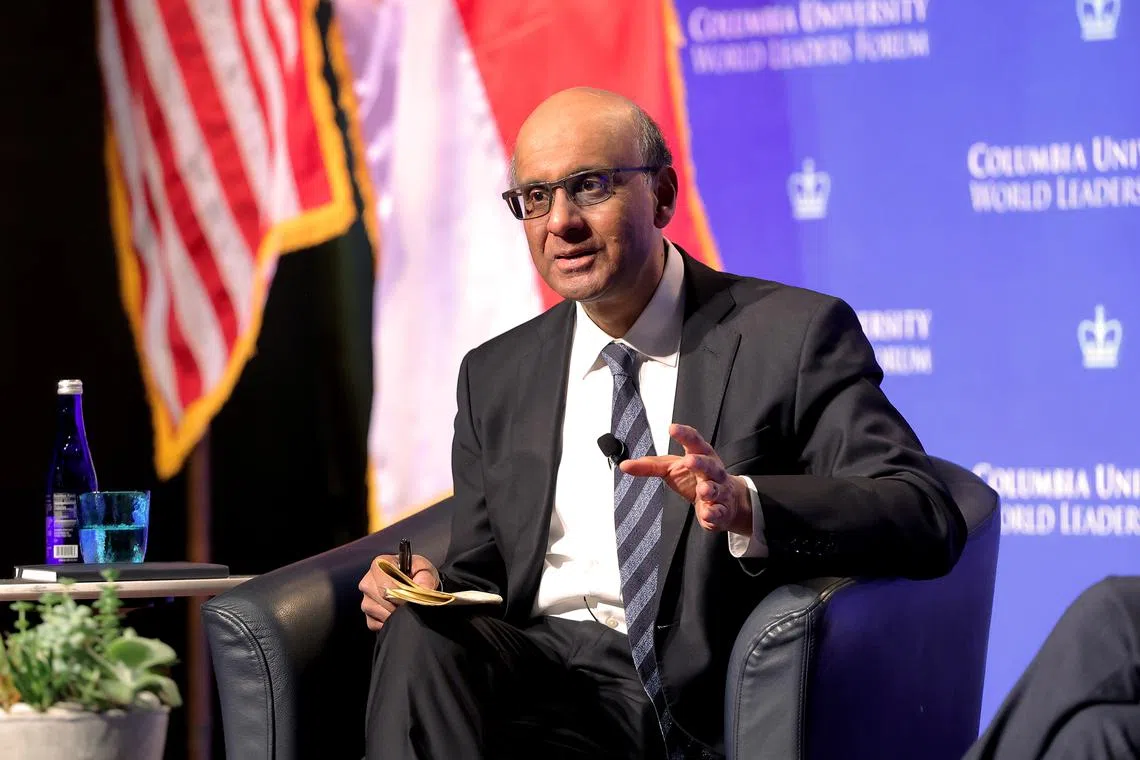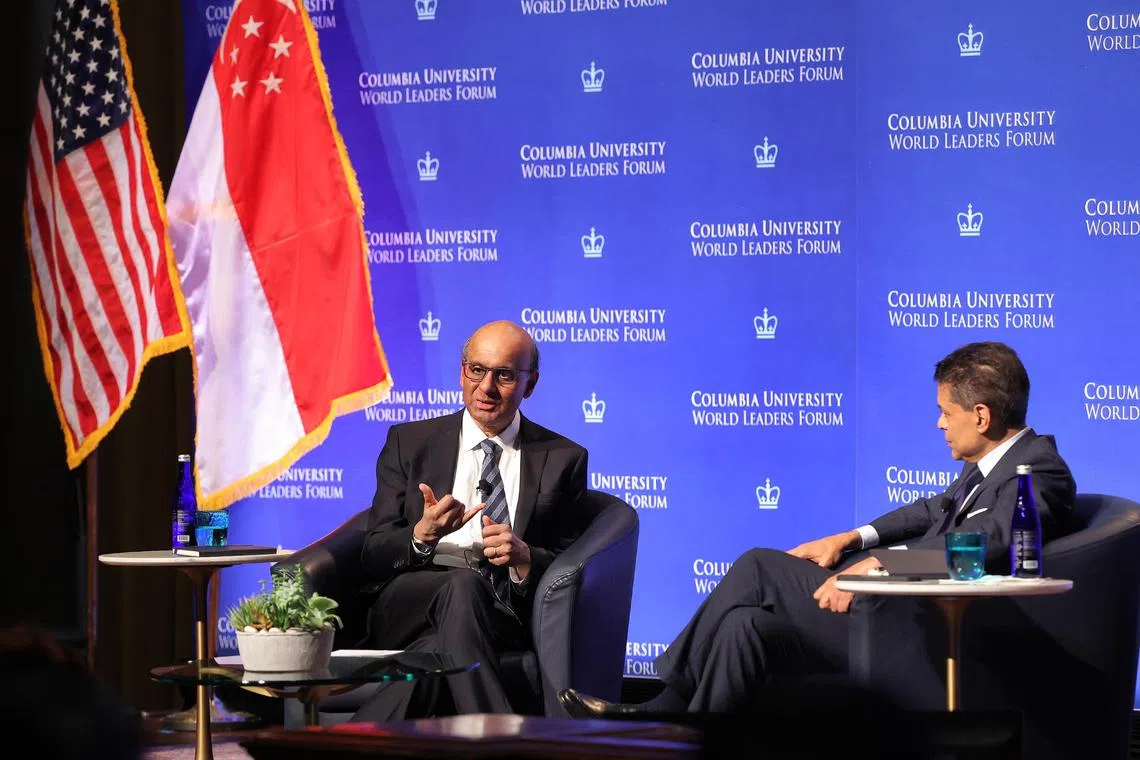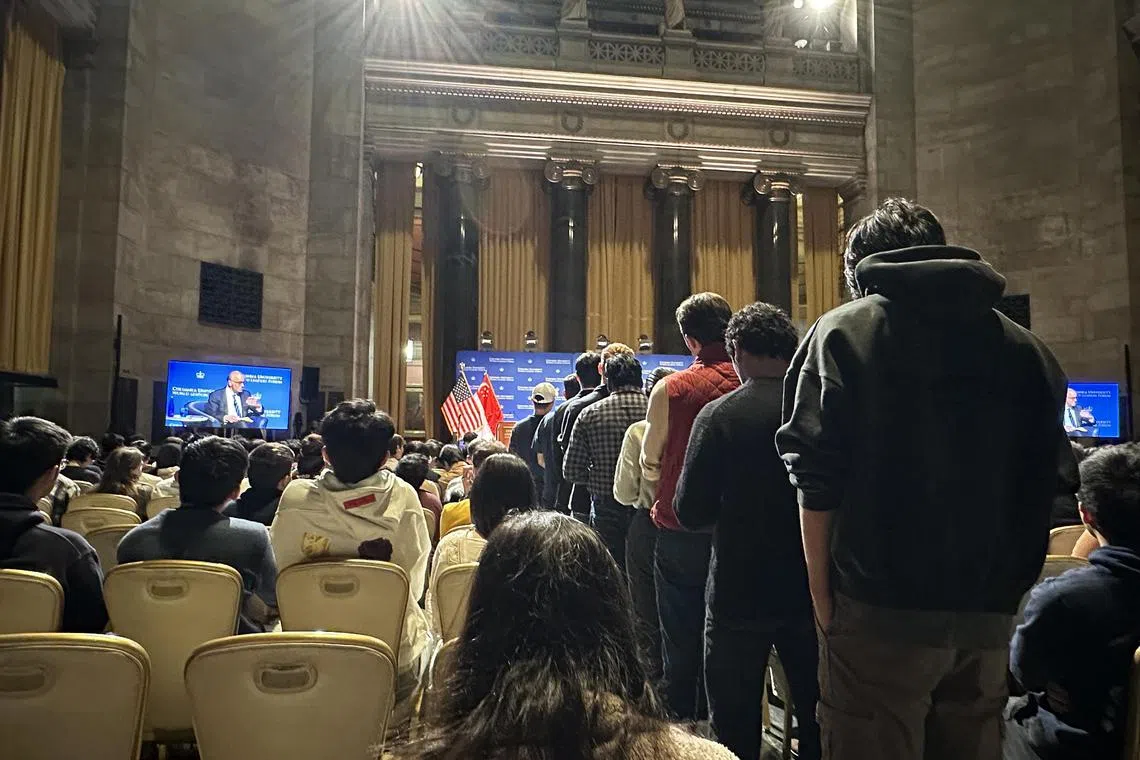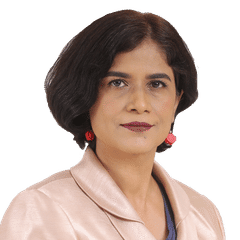President Tharman calls for resilience and optimism to shore up an unravelling world
Sign up now: Get ST's newsletters delivered to your inbox

In his speech at Columbia University's World Leaders Forum, President Tharman Shanmugaratnam said the ways in which multilateralism and democracies function will have to be reoriented.
PHOTO: MCI
Follow topic:
NEW YORK – The central task in an unravelling world is to build resilience and optimism, President Tharman Shanmugaratnam said while delivering the Gabriel Silver Memorial Lecture at Columbia University’s World Leaders Forum in New York on Nov 28.
To do this, the ways in which multilateralism and democracies function will have to be reoriented, Mr Tharman said during his first major international event since taking office.
“There are no perfect solutions, but there are bold actions which are still within our reach,” he told the audience of nearly 300 university students and faculty who packed the high-domed Low Library rotunda on a chilly evening in New York.
He was speaking on the second day of his ongoing working visit to the United States.
The event was co-sponsored by the Institute of Global Politics at the School of International and Public Affairs.
The lecture was established in 1949 to foster greater international understanding. Singapore’s then Prime Minister Lee Kuan Yew spoke at the same forum in 1968. Other eminent speakers have included West Germany’s first chancellor, Mr Konrad Adenauer, and former US treasury secretary Larry Summers.
“The world we knew is gradually unravelling, and there’s no telling where this will end,” Mr Tharman said, in a reference to the war in Europe, the bloody conflict in the Middle East and US-China tensions, all of which have shaken up the international order that has underpinned the world’s security and prosperity for decades.
“But it’s not just about bad events and bad actors,” he said.
“We have to look deeper; look at the powerful destabilising undercurrents in the world we are in – geopolitical, ecological, and even the domestic undercurrents within our societies.”
These may be slow-moving forces, but they compound each other and can push the world past the tipping point into unpredictable and irreversible realms, he said.
“If we keep ignoring those undercurrents, we’re just waiting for the next crisis to come. We will be responding to one crisis after another at great cost to human life, to livelihoods and to the credibility of both democracies and the global order.”
One of these is the ebbing of the rules-based order, which is evident in many ways, Mr Tharman said, pointing to more frequent and longer conflicts and to the greater threat to sovereignty, particularly for smaller nations. What is more, fragmentation of the highly integrated global economy will come at great cost, he warned.
A key complication is the US-China relationship as the world transitions to become truly multipolar, he said.
“That’s the central axis of tension that will determine whether we spiral down or stabilise,” he added, describing the Nov 15 meeting between US President Joe Biden and his Chinese counterpart Xi Jinping as hinting at a “pause” in the trajectory of a worsening relationship.
“We know we’re not in a unipolar world anymore, but we are not yet in a truly multipolar world. And we are certainly not yet in a world of stable multipolarity. It may take some time to get there. But in the meantime, the US-China relationship does require stability,” he said.
On the planet’s existential crisis as a result of climate change, Mr Tharman struck a more hopeful note, saying it has become a fallacy that obtaining a better future means paying a great cost today.
“That was the old thinking. But we now know that there is no real trade-off if we invest in new technologies and invest in new models of growth,” he said, noting that it is possible to keep growing while decarbonising the global economy.
The third factor – domestic undercurrents – is eroding trust in democracy, he said.
“Our core problems globally are really in domestic social and political dynamics,” he said, noting that too many societies have not succeeded in ethnic and immigrant integration.
“We are seeing a growing unfamiliarity between people with different educational levels, people in different professions or walks of life, or who live in different parts of the country – the cities, suburbs, rural areas. A growing distance between people and a gradual loss of trust among each other and trust in the institutions of democracy, including government.”
The attempt by multicultural nations, in this scenario of alienation, to create a common culture was the topic of an exchange between Mr Tharman and CNN host and Washington Post columnist Fareed Zakaria in a dialogue following the speech.
Mr Zakaria said the US had managed to create a common culture around a shared set of political ideals that people united around. In this way, it is unlike countries in Europe, as well as Singapore, where different communities live within their own traditions while also meeting in common civic spaces. Mr Zakaria asked if the rising rates of interracial marriages in Singapore mean that this model needs an update.

The attempt by multicultural nations, in this scenario of alienation, to create a common culture was the topic of an exchange between President Tharman Shanmugaratnam and Washington Post columnist Fareed Zakaria.
PHOTO: MCI
About one in six marriages involving citizens in Singapore was interethnic in 2022, in line with the trend in the previous year. About a third of citizen marriages involved transnational couples, an increase from 29 per cent in 2021.
Mr Tharman contrasted the Singapore experience with that of Europe and the US, saying that the Republic chose not to leave matters up to chance.
“Singapore never went for a melting pot concept of multiracialism. But neither did we go for the quilt of diversity in different patches, where we live and let live – live in your own neighbourhoods like they do in the banlieues in Paris, you grow up in different schools, and you have your own practices, but you sing the same national anthem. We didn’t go for that either.
“We actually went for a very intrusive model of integration,” he said, pointing to Singapore’s school systems, housing policies, offices and markets, which are designed to encourage daily interaction between communities.
Europe’s quilt model looks vibrant and attractive initially, he said. “But the moment you start getting pulls on that fabric, coming from outside your society or from within, the seams between each of the patches fray,” he said.
And while the US appears integrated, it has not managed to do away with segregation in housing, neighbourhoods and schools, he added.
“We can’t really lecture each other on what’s necessary because we come from different histories,” he said.
“Singapore, by force of an unusual start to nationhood, went for a very intrusive approach of weaving those threads together into a common fabric, but recognising that they were different threads. And people did want to retain their own sense of identity, their faith, a sense of their own culture. It gave you some meaning in life, but you were part of a common fabric of Singapore society.
“And more and more I do feel as we go forward as a country, we’ve got to make sure that people don’t just see themselves as persons of different races and religions, not just see themselves as sharing a Singaporean nationality, but as sharing each other’s cultures as well.
“Taking an interest in each other’s cultures, speaking a bit of language. You don’t need to be able to write, maybe not even read, but speak some of each other’s languages. Most importantly, grow up together, make friends with each other. You might get married or not get married to each other. But you’re friends.
“And Singapore can do that. But it would not have been possible had we not had that model of integration from the start – in schools, housing, at work.“
In his speech, Mr Tharman also laid out what societies needed to do to fight the destructive forces. “Our central task has to be to build resilience and optimism at this time of radical uncertainty, and to address and roll back these undercurrents,” he said.
“We must find ways for multilateralism to work in an imperfect world.
“We have to build coalitions of the willing to address the most urgent challenges of the global commons, and to preserve rules of the game in global competition. And keep the coalitions open to new members.”
Democracies, where political leaders can be too focused only on winning the next election, also have to be reoriented, he said, pointing to the need for politics to be “less short term and less insular... so that democracy is less divisive in practice”.
Squaring up to the looming challenges, even when distant, is in each country’s own interest, he said.
“It must surely be possible for each society to recognise that it is in its own interests to invest in the global commons, because we’re all going to be affected by its erosion. It must be possible to recognise that it’s in each society’s interests to invest in the long term today, rather than pile up an even larger burden in the decades to come,” he said.
“It must be in our own interests to find ways in which democracy bridges differences, rather than widens them,” he added.
“And we have to do this remembering that we are in a world where we can be very easily pulled apart, within our own societies and internationally.”

Students queueing up to ask questions during the hour-long interaction with President Tharman Shanmugaratnam at the Low Memorial Library.
ST PHOTO: BHAGYASHREE GAREKAR
Over two dozen students lined up in the aisles to ask questions on diverse issues ranging from Singapore’s artificial intelligence strategy to the problem of its ageing population to reversing deglobalisation.
“I wanted to ask if he had a solution to stop the Ukraine war,” said Ms Marianna, an undergraduate, who also queued up for the mic.
“But I did not get a chance. There are just too many issues in play.”


